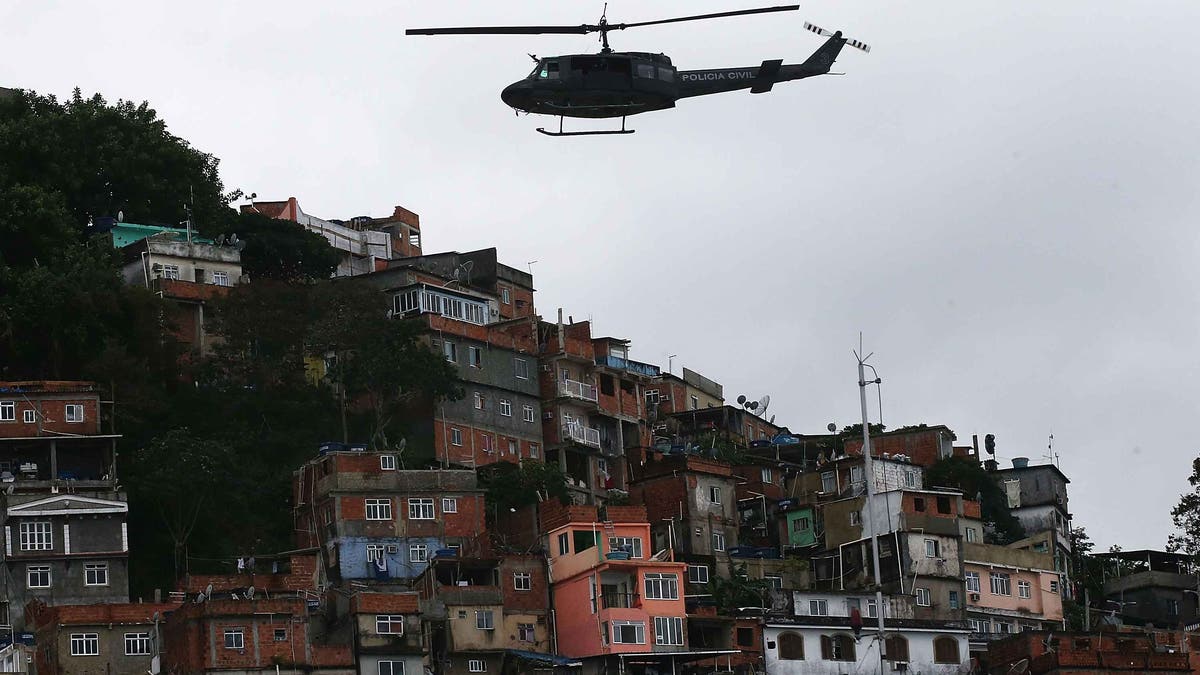
A Civil Police helicopter patrols over the Pavao-Pavaozinho favela on June 3, 2014 in Rio de Janeiro, Brazil. (2014 Getty Images)
RIO DE JANEIRO – With the deepening of the economic crisis in Brazil, new investments in local police has dropped to virtually zero, which is impacting directly on the levels of street crime in Rio — just as the city is preparing to host the 2016 Olympic Games and hundreds of thousands of athletes and fans.
The latest data released by the Public Security Institute (ISP) show that the number of thefts and homicides is growing at an alarming rate. Just in April, thefts on city streets increased by 22 percent compared to the same period of 2015: 6,797 cases were reported in just that month, according to ISP.
Three of those were two Spanish Olympic sailors and their coach, who were mugged at gunpoint by five teenagers in what is considered a safe neighborhood, Santa Theresa, just 20-minute walk from the Olympic sailing venue.
“We were a bit naive, a bit too daring, and were lucky to have survived,” Fernando Echavarri told the Associated Press. “We were too confident, and being confident in Rio is not a good thing.”
The increase in the number of rapes in the streets of Rio – 428 cases reported in April – is also disconcerting. Just two months before the kickoff of the Games, the nation and the world were rattled with the case of a 16-year-old girl gang-raped by 30 men. The number of homicides were up 15 percent in the first four months of 2016 compared with last year, according to the latest statistics cited by the Washington Post.
Still, authorities insist that the 15-day event will be safe for visitors, with 15,000 soldiers from the armed forces added to the some 70,000 police patrolling Rio’s streets during the Games.
José Mariano Beltrame, Rio's Public Security Secretary, told Fox News Latino that they have managed to work around the $583.58 million cut from the more than $2.9 billion originally budgeted for the city’s security this year.
“There was a range of increases, which for us was very bad,” he said. “But since we are sure that we have full support from various ministries I believe it will go normally.”
He pointed out, however, that his duty is to protect the entire city and needs to make sure no sector is neglected.
That is the same concern of José Trajano, a researcher at the Laboratory for the Analysis of Criminal Violence at the State University of Rio, who fears the rest of the city will be more vulnerable to criminals – particularly those areas not visited by the tourists.
"It's unacceptable, because the areas that are already neglected will end up suffering the most,” he told FNL. “[It’s a] vicious cycle, where those who get more violence, and therefore less tourists, will continue to get the less investments because it's not a ‘visible’ area.”
While optimistic about safety during the Olympic season, Beltrame complained about the lack of investments in the city's slums, called favelas, after the “pacification project” launched in 2008 to restore some level of peace in these areas. That project, however, ended up being a flop and failed in virtually every place it was installed.
Complexo do Alemão, a set of slums covering a long patch between the International Airport and the touristic South Zone, received a $200 million infusion of cash but it had little to no effect on crime. In May, two people were killed in a clash between police and drug traffickers, who continue to dominate the region.
So far this year, 40 police officers were killed in Rio.
According to Beltrame, the Pacification Program was supposed to be followed by a social assistance push fed with resources from other areas of the government, a follow-up project "that never came."








































